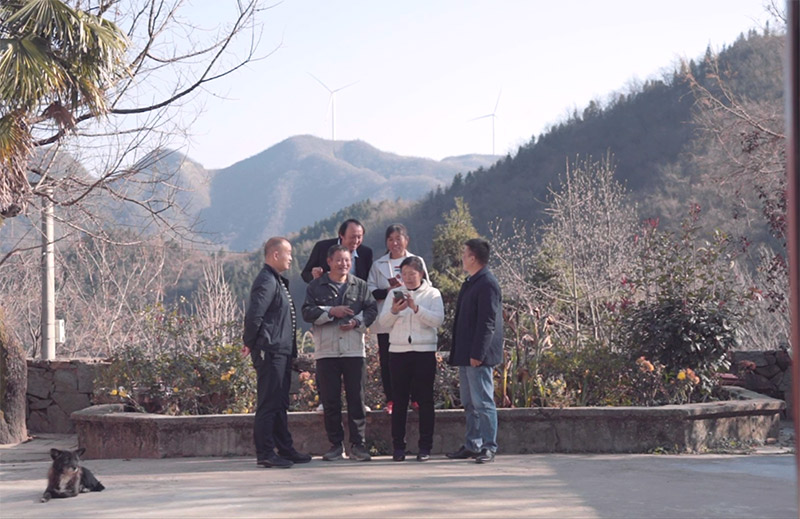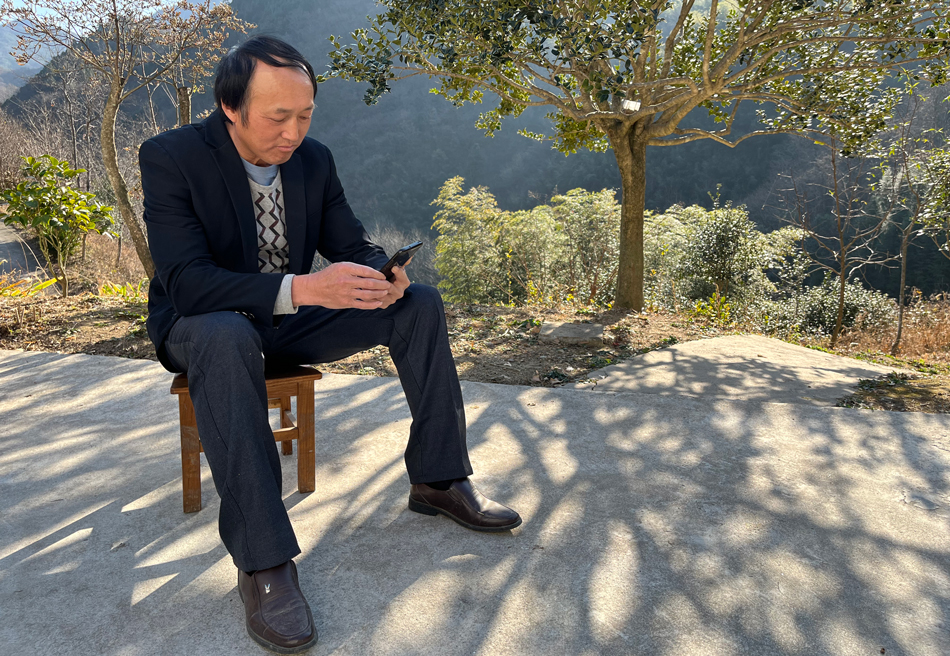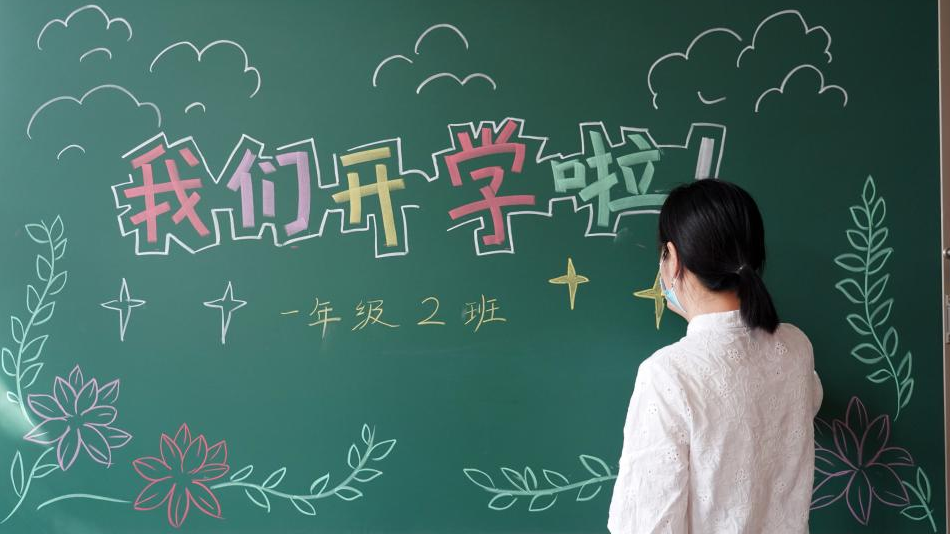Beyond the mountainside: Breaking free from digital isolation
Editor's note: This story is part of a series illustrating China's "whole-process people's democracy."
Liu Hongrui seldomly wears masks in the neighborhood. There is no need to wear one. Dwelling along a cliffy hillside in Jinzhai County, Lu'an, east China's Anhui Province, the 15-year-old and his parents are one of the only three households still living nearby. The unwelcoming mountains connected by zigzag paths have been their shields and source of protection.
But living in seclusion and isolation also has its downsides—for more than a decade, there had been little to no mobile phone signal strength in their area, to say nothing of broadband. Liu grew up inured to living between two worlds—one with signals, one without—as he frequently commuted between his home and school. Then the COVID-19 epidemic brought all classes to an abrupt halt, and students were directed to attend school in the virtual world, one that Liu's family had no access to.

Tale of two worlds
It was the early spring of 2020 when a wintry chill still lingered and the frigidity of the mountains reigned. The whole family was holding up a cellphone hunting for signals around the house. They found it on a hillock next to the pig shed—sporadic signals, two bars at best, Liu later recalled. Liu's father rigged up a tiny shack on the spot with plastic cloth and brought in a brazier every day, hoping to fend off the bitter cold that permeated the mountain air. "I studied in the shack for seven to eight hours a day. It was basically my second roost, with the desk being my tiny territory," the middle school student told People's Daily Online.

Photo taken on Dec. 5, 2021, shows the shack in which Liu Hongrui had studied for nearly two months. (People's Daily Online/Xu Mingyue)
Despite all the efforts his family could possibly make, the connection was so terrible that Liu described it as "[it was just like] in the middle of a sentence, the speaker would freeze, only to go on talking one minute later." Usually, each online course took about half an hour, but Liu needed more than forty minutes to watch the full duration and much longer to process the full content, all at the expense of school recess. During his nearly two-month stay in that shabby and solitary "classroom," Liu's academic performance slipped fast from his spot at the top of the class.
Even after school reopened, a sense of isolation remained. For Liu, the digital divide was as insurmountable as the mountains that separated him from the rest of the class—with textbooks being all he could exploit. For the rest of his family, on the other hand, the absence of an Internet connection had always been a slow burn.
Liu Peng, Liu's elder brother who now works and lives in Hefei, capital of Anhui Province, dredged up several unpleasant memories in the Internet-free home. "I bought a television two years ago when I got married. But with no Internet, it was just a decoration," he said, pointing to the large smart TV now sitting inside his parents' bedroom.
He also shared a brief bitter-sweet family anecdote that happened during the Spring Festival, when relatives and friends would send red envelopes (gift money) through social media applications. The whole family was sitting under the tree where unstable signals occasionally popped up to let them snap up their share of the lucky money. And yet, with such a poor connection, they were often just too slow to capture any.
Liu Peng believed that the Internet should be a necessity, especially for the younger generation. Living outside the "information island" for too long, he really had a hard time coming back home. "When I went back to my family, I lost contact with the rest of the world," Liu Peng added. "It felt like being completely cut off."

Photo shows Liu Hongrui studying in the shack. (People's Daily Online/Xu Mingyue)
Quest for connection
For Liu Peng, his younger brother's piteous experience in the shack was a catalyst, the last straw to prompt him into action.
Last year, he contacted the local telecom companies and grumbled about the dilemma, and they did dispatch staff to his parent's house to survey the field. But the reply came out very disheartening— setting up an Internet system in the rugged area would cost too much; and considering that less than a dozen of people lived there, it would be uneconomical, they said.
Liu Peng didn't give up on his attempts to link his family with the world beyond the mountains. He decided to resort to a broader channel other than just making in-person complaints—namely, that of the Internet. "The Internet is very powerful in my mind," he said, "not only can it spare the leg work, but it is also more potent…with its far-and-wide reach."
On April 12, 2021, Liu Peng logged in on the Message Board for Leaders, a platform run by People's Daily Online to enable government officials to hear and address public concerns, and left a message to the Secretary of the Lu'an Municipal Committee of the CPC. "I'm a villager from Laozhuang group, Hejiawan Village, Jinzhai County. Previously, I complained that there was no signal and broadband in my home and that they (telecom companies) only installed the telecom box along the street, in total disregard of people living in the mountain area," he wrote.
Even though it was just a coincidence that Liu Peng came up with the idea of posting his concerns on the online platform, he was more optimistic about the outcome than a year ago. "Because it is more transparent," he said, "the message would stick there unless the problem gets addressed."
Three days after he posted that message, local officials convened a meeting with representatives from the telecom company to discuss ways to set up broadband. After rounds of negotiations, the company decided to incorporate the three households into their "Safe Village Project," an initiative to deploy information technologies for villagers as a crime prevention measure.
[Related Reading: What it takes to build a rural school - a People's Daily Online short film]
The whole plan, in which the local government and China Telecom jointly invested over 200 thousand yuan, lasted for almost half a month, consuming 1.9 kilometer-long cables, 14 utility poles, and 3 telecom boxes. But for Ye Tian, a local official who oversaw the project, it was all worth the cost. "This is an information society, and living without the Internet is just unimaginable," he told People's Daily Online during an interview. "We must do whatever it takes to meet people's needs for Internet access."

Photo shows Liu Hongrui studying in his room. (People's Daily Online/Xu Mingyue)
A broader world
Liu Hongrui still clearly remembers how workers set up cables over the mountains and in front of the house, how they told him not to worry about online classes anymore, and how the flow of a Wi-Fi network appeared at his home for the first time, enlivening the muted television and offline cellphones.
Looking back on his lone journey in the shack, he was very appreciative of the sustained efforts made by his brother, the telecom workers, and local officials. Jointly they have transformed the way he now receives his education.
"Now I can acquire knowledge through online classes at any time, while in the past I had to take a long ride to buy books and school materials," Liu said, who was convinced that education is the only way to rid himself of the shackles of the rolling mountains. "I want to walk out of the mountains by studying…so that someday when I'm old, having accumulated my career and fortune, I will return to help those kids who are 'trapped' in the mountains just like me."
The arrival of broadband has also brought dramatic changes to other family members. Liu Peng, who now works as a real estate agent in Hefei, no longer worries about losing contact with his parents as they make phone calls regularly through WeChat. Sometimes, he would also check the real-time footage captured by the camera which shows images from the family's yard: including his mother trimming vegetables to prepare for dinner, his younger brother petting the dog, or his father returning home after a day's work at the construction site.

Photo taken on Dec. 5, 2021, shows Liu Wenguo scrolling through his phone in the yard at the front of the family's house. (People's Daily Online/Meng Bin)
Liu Wenguo, the father of Liu Peng and Liu Hongrui, has learned how to use Douyin, a short-video streaming application, from his sons. He is fond of checking clips posted by his relatives and friends to know how their life is going. He has also developed a hobby of sharing his own life—from the beautiful sceneries he sees in the mountains to the construction projects he is working on.
"At its best, I got ten thousand views and 500 likes," he said jubilantly.
Photos
Related Stories
- Message Board for Leaders hosted by People's Daily Online exemplifies strengths of China’s whole-process people's democracy
- Commentary: Understanding China's whole-process people's democracy at "two sessions"
- Pets, trash and taxes: Foreigners chip in on China's whole-process democracy
- Infographic: China’s whole-process people's democracy
- China's whole-process people's democracy features complete set of institutions: expert
Copyright © 2022 People's Daily Online. All Rights Reserved.









